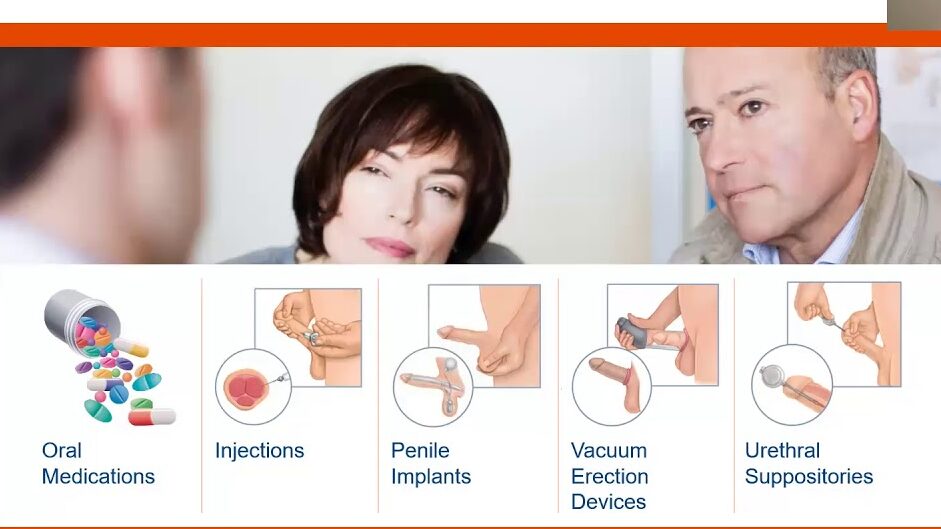Erectile Dysfunction Specialists Near Me: Find Top Local Doctors Now

Understanding Erectile Dysfunction: Exploring Causes and Solutions

Erectile dysfunction (ED) is a condition that affects a significant number of men worldwide. Understanding the causes behind this complex issue is crucial in order to explore effective solutions. There are various factors that can contribute to the development of ED, including physical, psychological, and lifestyle-related aspects.
Physiologically, ED can be caused by underlying health conditions such as cardiovascular disease, diabetes, hormonal imbalances, or neurological disorders. It can also occur as a side effect of certain medications or treatments. Additionally, lifestyle factors like smoking, excessive alcohol consumption, poor diet, and lack of exercise can all play a role in the development of ED.
On the psychological front, stress, anxiety, depression, and relationship issues can significantly impact sexual function. Moreover, certain personal habits like excessive pornography use or performance anxiety can contribute to the onset or worsening of ED.
Exploring the causes of erectile dysfunction requires a comprehensive approach that considers both the physical and psychological aspects. By identifying the underlying factors contributing to ED in each individual case, healthcare professionals can tailor treatment plans to address the specific needs and circumstances of the patient. It is also important to consider the potential interactions between medications, underlying health conditions, and lifestyle choices when designing a treatment strategy.
In the next section, we will delve deeper into the signs and symptoms of ED and discuss when it is necessary to seek professional help. Recognizing and addressing this issue promptly can lead to more successful outcomes and a better quality of life for those affected by erectile dysfunction.
Recognizing the Signs of Erectile Dysfunction: When to Seek Professional Help

Erectile dysfunction (ED) is a common condition that affects many men at some point in their lives. It is characterized by the inability to achieve or maintain an erection sufficient for satisfactory sexual performance. While occasional difficulty with erections is normal, persistent or frequent problems may be a sign of an underlying health issue.
One of the key indicators of erectile dysfunction is the consistent inability to get or keep an erection during sexual activity. This can be a cause of concern and can lead to feelings of frustration, stress, and even relationship difficulties. If you experience these difficulties on a regular basis, it is important to seek professional help.
It is important to note that erectile dysfunction can be caused by a variety of factors. These may include physical conditions such as diabetes, heart disease, and hormonal imbalances, as well as psychological issues like stress, anxiety, or depression. Recognizing the signs of erectile dysfunction and seeking professional help can provide valuable insights into the underlying causes and guide the appropriate course of treatment.
The Role of Specialists in Treating Erectile Dysfunction: Why Consultation is Important

When it comes to treating erectile dysfunction (ED), seeking consultation from specialists plays a crucial role in achieving successful outcomes. Specialists in this field have advanced knowledge and expertise in diagnosing and treating the underlying causes of ED, ensuring that patients receive tailored and effective treatment options. These specialists may include urologists, endocrinologists, or sexual medicine specialists, who are well-versed in the intricate workings of the male reproductive system and have a deep understanding of the physiological factors that influence erectile function.
Consulting with a specialist is important to accurately identify the root causes of ED, which can vary from physical to psychological factors or a combination of both. By carefully assessing a patient’s medical history, performing relevant physical examinations, and conducting specific diagnostic tests, specialists are able to develop a comprehensive understanding of the individual’s unique situation. This enables them to formulate personalized treatment plans that address the underlying causes of ED and take into account any coexisting conditions or medications that may be contributing to the problem. Through these consultations, patients can benefit from evidence-based treatments that have been proven effective in managing ED.
It is important to note that consultation with specialists also goes beyond the diagnosis and treatment of ED. For many patients, ED can be a distressing and emotionally challenging condition. Specialists are trained to provide the necessary emotional support and guidance, helping individuals navigate the psychological aspects associated with ED. By fostering open communication and creating a safe space for patients to express their concerns, specialists can empower individuals to address any underlying psychological or relationship issues that may be contributing to their condition.
Finding the Right Doctor for Your Needs: Factors to Consider
When seeking treatment for erectile dysfunction, finding the right doctor is crucial. The first factor to consider is the doctor’s specialization. Look for doctors who specialize in men’s health or sexual medicine, as they will have specific expertise in treating erectile dysfunction. It is also important to consider the doctor’s experience and reputation. Look for doctors who have a proven track record of successfully treating patients with erectile dysfunction and have positive patient reviews.
Another factor to consider is the doctor’s approach to treatment. Erectile dysfunction can have both physical and psychological causes, so it is important to find a doctor who takes a holistic approach. Look for doctors who consider both the physical and psychological factors that may be contributing to your erectile dysfunction and offer a range of treatment options. They should be open to discussing lifestyle changes, medication options, and alternative therapies.
Additionally, consider the doctor’s communication style and bedside manner. It is important to feel comfortable talking about your concerns and symptoms with your doctor, so finding a doctor who is understanding, compassionate, and easy to communicate with is crucial. During your initial consultation, pay attention to how the doctor listens to your concerns and how they explain your treatment options. A good doctor will take the time to fully understand your individual situation and provide clear explanations and recommendations.
By considering these factors, you can find a doctor who is knowledgeable, experienced, and empathetic, ensuring that you receive the best possible care for your erectile dysfunction.
The Importance of Local Specialists: Benefits of Seeking Treatment Nearby
When it comes to seeking treatment for erectile dysfunction, opting for local specialists can provide numerous benefits. One of the key advantages is the convenience factor. Being able to access treatment nearby means less time spent traveling and more time focusing on your health. In addition, local specialists are often familiar with the specific healthcare resources available in the area, which can streamline the process of obtaining diagnostic tests and accessing additional support services.
Another benefit of seeking treatment from local specialists is the potential for ongoing care and follow-up. Building a relationship with a nearby doctor allows for regular check-ups and monitoring of your condition. This ensures that any changes or adjustments that may be necessary can be addressed promptly. Additionally, local specialists are often well-connected with other healthcare professionals in the area, making it easier to access a multidisciplinary approach to treatment if needed.
In conclusion, choosing to consult with local specialists for erectile dysfunction provides convenience, ongoing care, and access to a network of healthcare resources. By considering the benefits of seeking treatment nearby, you can make an informed decision that supports your overall goals for managing this condition.
Researching and Selecting Top-Rated Erectile Dysfunction Doctors: Tips and Resources
Researching and selecting a top-rated erectile dysfunction doctor is a crucial step towards finding effective solutions for this common condition. With the abundance of medical professionals claiming expertise in this area, it is essential to navigate through the options thoughtfully and consider various factors before making a decision.
One important consideration is the doctor’s qualifications and specialization. Look for doctors who have specific experience and training in the field of sexual medicine or urology. These specialists possess in-depth knowledge about the male reproductive system and are equipped to provide the most comprehensive assessment and treatment options for erectile dysfunction. You can verify a doctor’s credentials by checking their certification from recognized organizations, such as the American Board of Urology or the International Society for Sexual Medicine.
Furthermore, it is beneficial to seek recommendations from trusted sources, such as your primary care physician or other healthcare professionals. They can provide insights based on their experiences with patients who have sought treatment for erectile dysfunction. Additionally, consider seeking referrals from friends or family members who have undergone successful treatments for this condition. Their personal experiences can offer valuable perspectives when selecting a doctor who is knowledgeable and skilled in addressing erectile dysfunction.
Remember, this is just the beginning of your journey towards finding the right doctor for your needs. It is crucial to thoroughly research and gather as much information as possible before making a decision. By adopting a comprehensive approach and considering factors such as qualifications, specialization, and recommendations, you can increase the likelihood of finding a top-rated erectile dysfunction doctor who will provide effective treatment options tailored to your individual needs.
Certainly! Here’s a concise data table on researching and selecting top-rated erectile dysfunction doctors, along with tips and resources:
| Researching and Selecting Erectile Dysfunction Doctors | Description | Source |
|---|---|---|
| Check Medical Credentials | Ensure the doctor is a licensed and board-certified urologist or sexual medicine specialist with expertise in treating erectile dysfunction. | American Urological Association – Find a Urologist |
| Read Patient Reviews and Testimonials | Explore online platforms, such as health review websites or patient testimonials, to gain insights into the experiences of other patients with the doctor. | Healthgrades – Find a Doctor |
| Consult Referral Services | Utilize referral services provided by reputable medical organizations to find qualified specialists in sexual health and urology. | Sexual Medicine Society of North America – Find a Provider |
| Verify Hospital Affiliations | Check if the doctor is affiliated with reputable medical institutions or hospitals, as this can be an indicator of their professional standing. | U.S. News & World Report – Best Hospitals |
| Inquire About Specializations and Experience | Confirm that the doctor specializes in sexual medicine or has significant experience in treating erectile dysfunction to ensure expertise in the field. | Cleveland Clinic – Center for Sexual Health |
These tips and resources can aid in the research and selection process of finding a top-rated erectile dysfunction doctor. Always consult with healthcare professionals for personalized advice.
Consulting with Specialists: What to Expect during Your First Appointment
During your first appointment with a specialist for erectile dysfunction, it is important to come prepared with relevant information about your medical history, lifestyle, and any symptoms you may be experiencing. The specialist will likely ask you detailed questions about your sexual health and overall well-being, as well as perform a physical examination to assess your condition. This initial consultation provides an opportunity for both you and the specialist to establish open communication and develop a comprehensive understanding of your unique situation.
One of the key aspects of your first appointment will be discussing the potential causes of your erectile dysfunction. The specialist will explore various factors that may contribute to your condition, such as underlying medical conditions, medication use, psychological and emotional factors, and lifestyle habits. By carefully evaluating these factors, the specialist can determine the most appropriate course of action and recommend targeted treatment options. Additionally, they may order further diagnostic tests, such as blood tests or imaging studies, to gain more insight into your condition. Remember, the goal of this initial consultation is to gather as much information as possible to form a personalized treatment plan tailored to your specific needs.
Diagnostic Procedures for Erectile Dysfunction: Common Tests and Assessments
One of the first steps in diagnosing erectile dysfunction (ED) is a thorough medical history and physical examination. This allows the healthcare provider to assess the patient’s overall health and identify any potential underlying causes of the condition. During the physical examination, the doctor will typically examine the genital area to check for abnormalities, such as the presence of lumps or inflammation.
In addition to a physical examination, there are several common tests and assessments that may be ordered to further evaluate the causes of erectile dysfunction. These tests can provide valuable information about the patient’s hormonal levels, cardiovascular health, and neurological function. One common test is a blood test, which can measure levels of testosterone, cholesterol, and other relevant markers. Another commonly used test is a nocturnal penile tumescence (NPT) test, which measures the frequency and strength of erections during sleep. Other imaging tests, such as ultrasound, may also be used to assess blood flow and identify any blockages or abnormalities in the blood vessels. These diagnostic procedures help guide healthcare providers in developing an effective treatment plan tailored to the individual patient’s needs.
Exploring Treatment Options: Medications, Therapies, and Lifestyle Changes
Exploring Treatment Options: Medications, Therapies, and Lifestyle Changes
When it comes to treating erectile dysfunction (ED), there are several options available that aim to improve sexual function and enhance overall wellness. Medications, such as sildenafil (Viagra), tadalafil (Cialis), and vardenafil (Levitra), are commonly prescribed to help men achieve and maintain erections by increasing blood flow to the penis. These medications work by inhibiting an enzyme called phosphodiesterase type 5 (PDE5), which allows for better circulation and improved erectile function.
In addition to medications, various therapies can also play a beneficial role in treating ED. For example, psychotherapy or counseling can address underlying emotional or psychological factors that may be contributing to the condition. Couples therapy may also be recommended to improve communication and reduce stress within the relationship. Additionally, vacuum erection devices (VEDs) and penile implants are alternatives for those who do not respond to medication or prefer non-pharmacological interventions. These devices work by creating a vacuum around the penis to draw in blood and produce an erection, or by surgically implanting inflatable or semirigid rods into the penis to provide rigidity when desired.
• Medications such as sildenafil, tadalafil, and vardenafil increase blood flow to the penis by inhibiting PDE5
• Psychotherapy or counseling can address emotional or psychological factors contributing to ED
• Couples therapy may improve communication and reduce stress within the relationship
• Vacuum erection devices (VEDs) create a vacuum around the penis to draw in blood and produce an erection
• Penile implants surgically implant inflatable or semirigid rods into the penis for rigidity when desired
The Importance of Open Communication: Discussing Erectile Dysfunction with Your Partner
Open communication is crucial when it comes to discussing erectile dysfunction with your partner. It is common for individuals with erectile dysfunction to feel embarrassed or ashamed, but keeping the lines of communication open can lead to understanding and support from your partner. By sharing your concerns and experiences, you can work together to find solutions and improve your sexual intimacy.
When discussing erectile dysfunction with your partner, it is important to approach the conversation with empathy and understanding. Start by choosing a comfortable and private setting where both of you can speak openly and honestly. It may be helpful to do some research beforehand to have a better understanding of the condition and its potential causes and treatment options. By educating yourself, you can provide your partner with accurate information and alleviate any misconceptions or fears they may have. Additionally, expressing your emotions and concerns openly can help your partner better understand what you’re going through and offer their support.
Managing Emotional and Psychological Aspects of Erectile Dysfunction: Support and Counseling
Support and counseling play a crucial role in managing the emotional and psychological aspects of erectile dysfunction (ED). It is important to address the psychological impact of ED as it can significantly affect a man’s self-esteem, confidence, and overall well-being.
Counseling sessions can provide individuals with a safe and non-judgmental space to express their concerns, fears, and frustrations regarding ED. A trained counselor or therapist can help individuals understand the underlying psychological factors contributing to their condition and develop effective coping strategies. They may use various therapeutic approaches, such as cognitive behavioral therapy (CBT), to help individuals challenge negative thoughts and beliefs surrounding ED and improve their mental health.
Additionally, support groups can offer a valuable source of encouragement and understanding for those dealing with ED. By connecting with others who have similar experiences, individuals can gain insight, share their stories, and learn from each other’s journeys. Support groups can foster a sense of community and reduce feelings of isolation, providing individuals with a network of support to navigate the emotional challenges of ED.
Overall, seeking support and counseling can be an integral part of managing the emotional and psychological aspects of ED. It can offer individuals the tools and resources they need to cope with the challenges that arise from this condition, ultimately improving their overall quality of life.
Maintaining Sexual Health: Long-Term Strategies for Preventing and Managing Erectile Dysfunction
Long-term strategies for preventing and managing erectile dysfunction play a crucial role in maintaining sexual health. One key aspect is adopting a healthy lifestyle that includes regular exercise, a balanced diet, and adequate sleep. Exercise enhances blood flow throughout the body, including the genital area, which can promote erectile function. Additionally, maintaining a healthy weight can help reduce the risk of developing conditions such as obesity and diabetes, which are known to contribute to erectile dysfunction.
Incorporating specific foods into your diet may also support erectile health. Some studies suggest that certain nutrients, such as zinc, vitamin E, and L-arginine, can improve erectile function. These nutrients can be found in foods like oysters, leafy greens, nuts, and seeds. However, it is important to note that the evidence supporting the direct impact of these nutrients on erectile dysfunction is limited, and it is advisable to consult with a healthcare professional before making any dietary changes. Taking a comprehensive approach to sexual health by combining exercise, a balanced diet, and appropriate medical guidance can help in preventing and managing erectile dysfunction effectively.
Support and Resources for Individuals with Erectile Dysfunction: Online Communities and Organizations
Joining an online community or organization that focuses on erectile dysfunction can provide valuable support and resources for individuals facing this condition. These platforms offer a safe and anonymous space for individuals to share their experiences, seek advice from others who have gone through similar challenges, and access information from healthcare professionals.
Online communities provide a wealth of knowledge about erectile dysfunction, covering various aspects such as causes, symptoms, treatment options, and lifestyle changes. By engaging with others who understand the physical and emotional impacts of erectile dysfunction, individuals can gain a sense of validation and belonging. These communities often serve as a source of encouragement, helping individuals develop coping strategies and maintain a positive outlook on their journey towards improved sexual health.
Moreover, these platforms usually feature reputable organizations dedicated to educating the public about erectile dysfunction and promoting research in this field. These organizations often provide resources such as informative articles, brochures, and webinars that delve into the topic. They may also offer educational materials for partners and loved ones to better understand and support individuals with erectile dysfunction. Having access to scientifically sound information is crucial in making informed decisions and ensuring the most effective treatment approach.
In conclusion, online communities and organizations focused on erectile dysfunction offer a valuable space for individuals to connect, learn, and access reliable information. By becoming part of these platforms, individuals can find support, gain knowledge about the condition, and empower themselves to take control of their sexual health journey.
How common is erectile dysfunction?
Erectile dysfunction is a common condition, affecting approximately 30 million men in the United States alone.
What are some common causes of erectile dysfunction?
Erectile dysfunction can be caused by a variety of factors including underlying health conditions, medication side effects, psychological issues, and lifestyle factors such as smoking and excessive alcohol consumption.
When should I seek professional help for erectile dysfunction?
It is recommended to seek professional help if you consistently experience difficulties achieving or maintaining an erection for several months or if it is causing distress in your relationship.
What specialists can help with the treatment of erectile dysfunction?
Specialists who can help with the treatment of erectile dysfunction include urologists, endocrinologists, and sexual health specialists.
How do I find the right doctor for my erectile dysfunction needs?
When looking for a doctor, consider factors such as their experience and expertise in treating erectile dysfunction, their location, and patient reviews and recommendations.
What should I expect during my first appointment with a specialist?
During your first appointment, the specialist will likely ask about your medical history, perform a physical examination, and may recommend additional tests or assessments to determine the underlying cause of your erectile dysfunction.
What are some common diagnostic procedures for erectile dysfunction?
Common diagnostic procedures for erectile dysfunction may include blood tests, ultrasound imaging, nocturnal penile tumescence testing, and injection tests.
What treatment options are available for erectile dysfunction?
Treatment options for erectile dysfunction may include oral medications, injection therapy, vacuum erection devices, hormonal therapy, psychological counseling, and lifestyle changes.
How important is open communication about erectile dysfunction with my partner?
Open communication about erectile dysfunction with your partner is crucial for maintaining a healthy and supportive relationship. It can help alleviate stress and anxiety and allows for mutual understanding and support.
Are there any online communities or organizations that provide support for individuals with erectile dysfunction?
Yes, there are several online communities and organizations that provide support, information, and resources for individuals with erectile dysfunction. These include forums, chat groups, and nonprofit organizations dedicated to raising awareness and providing support.






